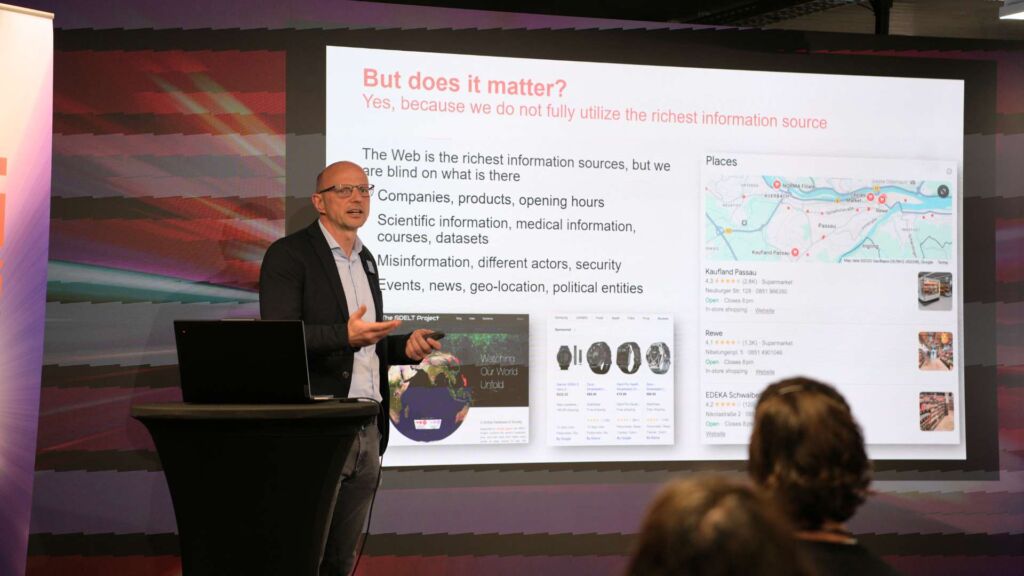Network Spotlight on the Future of Web Search and Associated Interdisciplinary Challenges
The fourth edition of the IT:U Network Spotlight invited researchers and innovators to discuss how web search is evolving in the age of Generative AI. Fellow Professor Michael Granitzer, an expert in data science and information retrieval, shared his insights on the technological, legal, and societal dimensions shaping the next generation of search technologies.
Exploring the Next Era of Web Search
In his keynote, he offered an accessible yet comprehensive overview of how today’s web search infrastructures work—and how AI is transforming them into intelligent, context-aware systems. Rather than simply retrieving results, future search engines will be able to generate, summarize, and synthesize information in ways that mirror human capabilities.
From a computer science perspective, he explained how retrieval systems are becoming essential extensions of Large Language Models (LLMs). Retrieval helps to reduce AI hallucinations and to keep outputs current and accurate. In this evolving landscape, retrieval mechanisms will remain fundamental to future AI systems—to the point where the LLM itself might be understood primarily as a sophisticated user interface technology, with the retrieval infrastructure serving as the critical backbone.
The Broader Impact: Legal, Economic, and Societal Shifts
However, web search systems encompass far more than computer science alone. As Michael Granitzer emphasized, web search serves as a central information source for our society, influencing public opinion and worldviews. This influence will become even more pronounced as AI systems increasingly mediate how we access and understand information.
The transformation also brings significant legal and economic challenges. Today’s web search ecosystem operates on an informal social contract: search engines route traffic to websites, incentivizing content creators to make their sites discoverable. But this delicate balance is already shifting. AI-powered summaries are reducing direct traffic to source websites, while website content is being harvested to train AI systems—often without compensation to the original creators. These developments raise a complex web of legal questions spanning copyright law, privacy rights, and compliance with emerging regulations like the EU’s AI Act.
Furthermore, the current web search business model relies heavily on advertising revenue. How this monetization approach will adapt to AI-based systems—and whether entirely new revenue models will emerge—remains an open and fascinating question with implications for the entire digital economy.
Key Interdisciplinary Challenges
Some key interdisciplinary challenges Michael Granitzer pointed out include:
- Challenge 1 – Preserving Content Creator Rights and Economic Sustainability
As AI systems increasingly consume web content for training and generate direct answers, the traditional traffic-based value exchange is breaking down. Finding equitable compensation models that reward content creators while enabling AI innovation is essential for a sustainable digital ecosystem.
- Challenge 2 – Ensuring Transparency and Mitigating Bias in AI-Mediated Search
When AI systems synthesize and generate information rather than simply linking to sources, issues of transparency, accountability, and potential bias become more complex. Developing frameworks to ensure diverse perspectives and verifiable information pathways is crucial for maintaining public trust.
- Challenge 3 – Navigating the Evolving Legal and Regulatory Landscape
The intersection of copyright law, privacy regulations, data protection frameworks, and new AI-specific legislation creates a complex compliance environment. Researchers and innovators must work alongside legal experts and policymakers to develop search technologies that are both innovative and legally sound.
Bridging Research and Real-World Applications
A key example of this bridge is OpenWebSearch.eu, a Horizon Europe project coordinated by Michael Granitzer. Within this initiative, his research focuses on building an Open Web Search infrastructure to empower innovators with access to web data and search solutions. The project lays the groundwork for a federated, AI-based search framework, where search data owners can provide search capacities over their own content—retaining full control over how their data is accessed, indexed, and used. By decentralizing the web search ecosystem, OpenWebSearch.eu aims to ensure greater transparency, diversity, and openness in how information is found and shared across Europe and beyond.
“Web search profoundly shapes what we discover on the internet every day. Today, this power lies in the hands of a few gatekeepers—a trend likely to persist with the rise of Generative AI. My research seeks to build a fairer, AI-driven search ecosystem where content owners retain control over their rights, and the economic model is not solely driven by advertising interests.
— Michael Granitzer, IT:U Fellow Professor of Information Retrieval & Data Science
Beyond AI-driven web search systems, his research as Fellow Professor of Information Retrieval & Data Science extends to several other real-world applications, including:
- Using AI models to analyse computer main memory in virtual machines to strengthen cybersecurity
- Applying machine learning techniques in astrophysics, such as analysing images from Mars or detecting crossings of planetary magnetic fields
- Analysing sensor signals from wearable devices with machine learning to detect and simulate human behavioural patterns, supporting advances in healthcare
Why Interdisciplinary Education Matters
Michael Granitzer shared that developing AI solutions requires teamwork and the ability to tackle complex, interrelated problems across algorithms, infrastructure, and real-world applications. He emphasized that project-based, interdisciplinary learning is essential for preparing future AI engineers to navigate and innovate within such a multifaceted landscape.
About the Network Spotlight
The Network Spotlight at IT:U is designed to showcase the work of our Fellows to a wider audience, highlighting innovative research that thrives on interdisciplinarity. It also underlines IT:U’s role as a Network University—linking researchers, innovators, and thought leaders to exchange perspectives and spark new collaborations.
📅 Save the date: The next Network Spotlight takes place on 11 November— more details coming soon!
